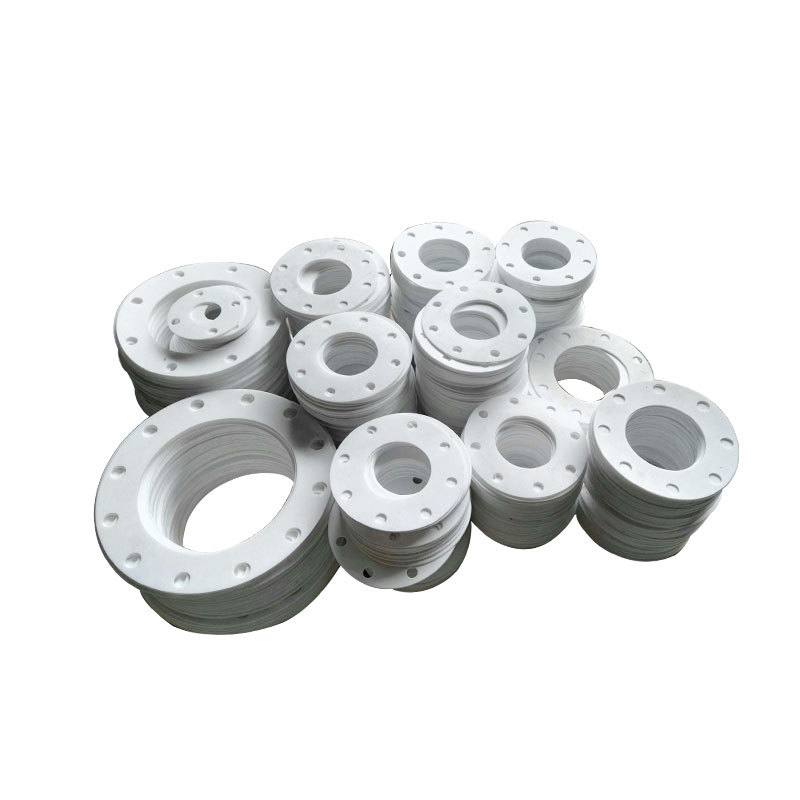
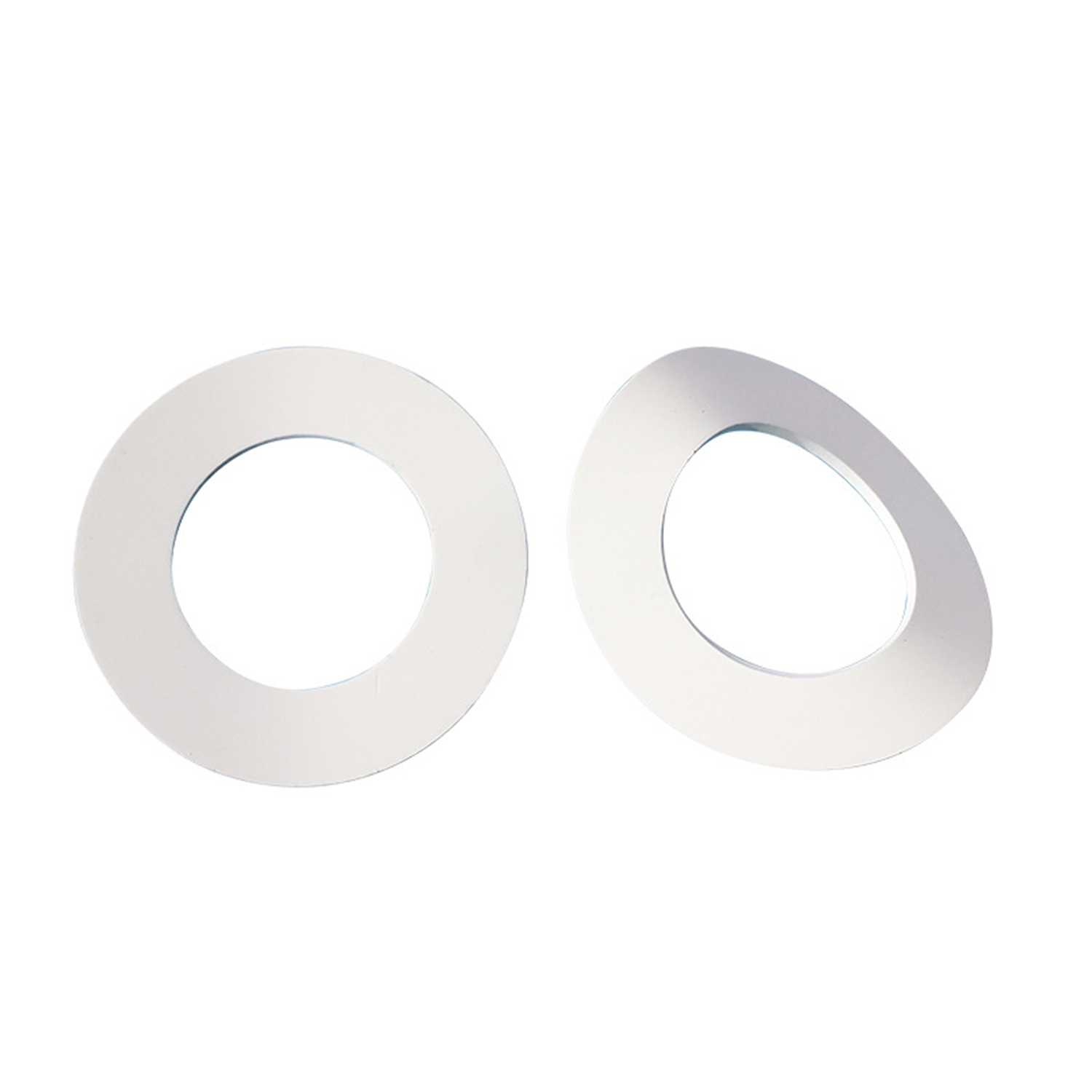
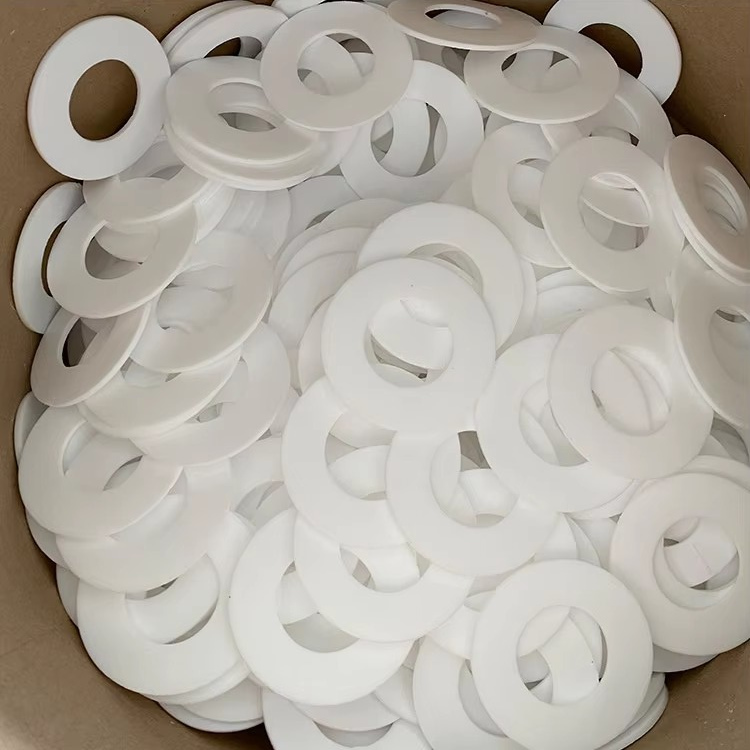
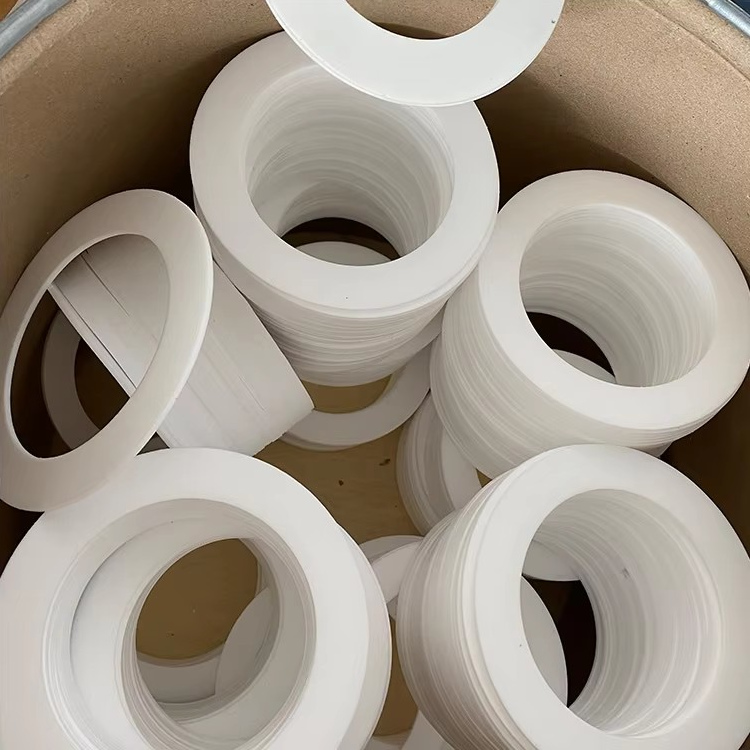
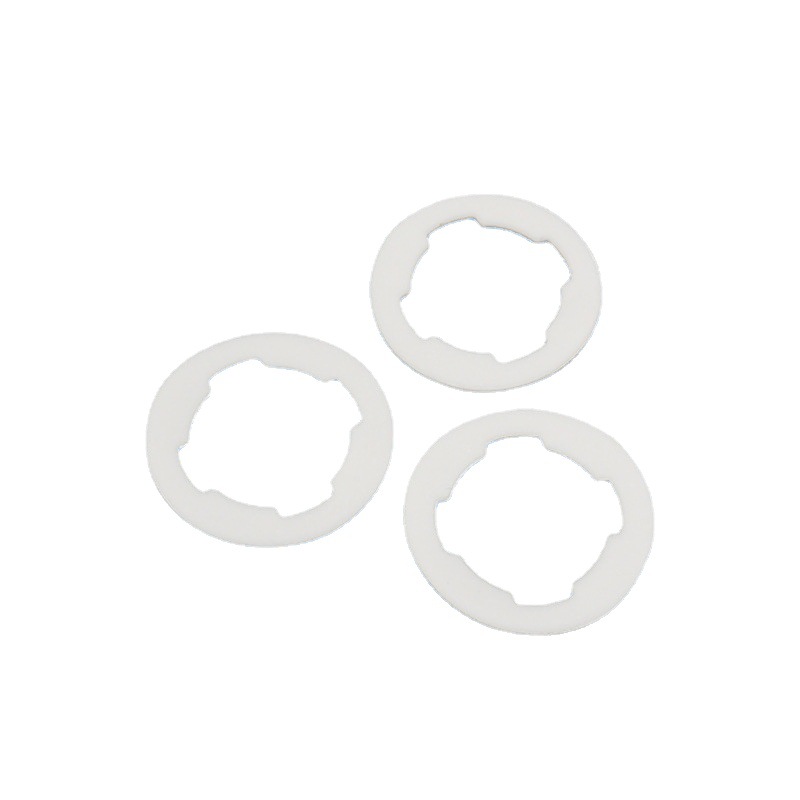
| Teflon Gasket | |
| Shape | Customized |
| Materials | PTFE |
| Performance | This product has high temperature resistance, corrosion resistance, excellent electrical insulation, aging resistance, low water absorption and excellent self-lubrication performance |
| Temperature | -180℃ to 260℃ |
| Colour | White |
| Thickness | Customized |
| Standard | JB/T 10688-2006 PTFE |
What is a “Teflon Gasket”?
Teflon Gasket, also known as PTFE gasket or polytetrafluoroethylene gasket, is a high-performance, versatile sealing material made of polytetrafluoroethylene (PTFE) as the main raw material.
According to the application and performance requirements, special ingredients such as metal powder and glass fiber can be added to enhance the performance of teflon gaskets.
The shape of the gasket is generally round, square, semi-circular, etc., and the diameter and thickness can be customized according to actual needs.
Features & Benefits of Teflon Gasket Include:
Product Feature
Excellent chemical stability:
Teflon gasket is resistant to most chemicals and solvents, including strong acids, bases and various organic solvents, which makes it stable in a variety of aggressive environments.
Excellent corrosion resistance:
The Teflon gasket sheet is extremely resistant to corrosive environments and maintains its performance even under harsh operating conditions.
High and low temperature resistance:
The Teflon gasket rings can operate in an extremely wide temperature range, and can usually be used for a long time at temperatures from +250 ° C to -180 ° C, and some documents even mention that it can maintain a certain degree of mechanical toughness at -196 ° C. (Source: Reference Article 1)
High lubrication non-stickiness:
Teflon gasket has an extremely low coefficient of friction and the surface does not adhere to anything, which makes it very useful in situations where friction needs to be reduced and adhesion prevented.
Good electrical insulation:
Teflon gasket has good electrical insulation properties and is suitable for sealing and insulating electrical and electronic equipment.
Waterproof, oil and stain resistant:
The Teflon gasket is triple-protected to maintain its performance in harsh environments such as moisture and oil.
Product Benefits
Improve the reliability and safety of equipment operation:
Thanks to its excellent corrosion and high temperature resistance, custom Teflon gasket ensures the proper operation of equipment under harsh conditions, reducing failures and downtime due to leakage or corrosion.
Extend the service life of equipment:
Corrosion resistance and high lubrication non-stickiness make the Teflon gasket less prone to wear or damage during use, thus extending the service life of the equipment.
Reduce maintenance costs:
Thanks to its excellent performance, the Teflon gasket components reduces maintenance costs and time associated with replacing seals.
Suitable for a variety of applications:
Due to its wide range of applicability and performance advantages, Teflon Gasket is widely used in many fields to meet the needs of different industries for seals.
What Special Features Can Be Incorporated into Teflon Gasket?
Multi-layer Composite Structure:
In order to improve the sealing performance and durability of the Gasket, the Teflon gasket can be constructed in a multi-layer composite structure. This structure will be polytetrafluoroethylene and other materials (such as metal, rubber, etc.) stacked together, taking advantage of the advantages of each layer of materials to form a gasket with higher strength and better sealing effect.
Special Shape Design:
According to different application requirements, the Teflon gasket can be designed in a variety of special shapes, such as L, U, V, etc. These special shapes can better adapt to the complex sealing surface and improve the sealing effect.
Reinforcement Material Filling:
The mechanical properties and wear resistance of Teflon gasket can be significantly improved by adding glass fiber, metal, graphite and other reinforcing materials Teflon. These reinforcement materials can withstand higher pressures and temperatures, extending the service life of the gasket.
Surface treatment:
Surface treatment of the Teflon gasket, such as spraying, etching, etc., can improve its surface properties, such as improved adhesion, wear resistance, etc. This helps to enhance the sealing effect and service life of the gasket in a specific environment.
BX Panel Felt Gasket Technical Information
Cutting and forming
Design drawings: Design and draw detailed cutting drawings according to the specific size, shape and thickness requirements of the gasket.
Cutting molding: Use professional equipment (such as die cutting machine, laser cutting machine, mechanical cutting machine, etc.) to cut the felt material into the desired shape and size according to the requirements of the drawing. This step requires precise control of the cutting speed and force to ensure smooth, burri-free edges of the gasket.
Back adhesive
According to the use of the product environment and requirements, choose the appropriate type of back adhesive, such as waterproof, temperature resistance, super bonding, etc. We offer 3M, Crown, Soken, Nitto, Sony, Luxking and other adhesive brands.
What Industries Use Teflon Gasket?
Teflon gasket is widely used in many industries due to its excellent chemical stability, corrosion resistance, sealing properties, high lubrication non-viscosity, electrical insulation and good aging resistance.
Chemical Industry:
Chemical Teflon gasket can resist the erosion of a variety of strong acids, strong bases and organic solvents, and is suitable for sealing various chemical equipment. Teflon gasket plays an important role in the sandwich sealing of chemical reactors, pressure vessels, condensers, reactors, heat exchangers and storage tanks.
Machinery Industry:
In the mechanical Teflon gasket is often used to seal bearings, pumps and other equipment to ensure the normal operation of equipment and prevent media leakage. Its high lubrication non-stickiness and good sealing performance reduce the friction between the mechanical parts and improve the operating efficiency and service life of the equipment.
Electronic and Electrical Industry:
Electrical Teflon gasket is also widely used in the electronic industry, mainly for the sealing and insulation of circuit boards, batteries and other equipment. Its electrical insulation performance is excellent, can effectively prevent current leakage and short circuit, to ensure the safe operation of equipment.
Pharmaceutical Industry:
In the pharmaceutical industry, where product purity and sanitary conditions are extremely high, Teflon gasket is often used to seal pharmaceutical equipment due to its chemical stability and non-viscosity. This helps prevent the drug from reacting with the gasket material, ensuring the quality and safety of the drug.
Food Industry:
Teflon gasket is also widely used in the food industry to ensure the cleanliness and hygiene of materials. Its special combination design can be used in the food industry where contamination is not allowed to ensure the safety and hygiene of food in the production process.
Aerospace and Environmental Industries:
Teflon gasket also plays an important role in the field of aerospace and environmental protection. Its high temperature resistance, low temperature resistance, corrosion resistance and other characteristics, so that it can still maintain good sealing performance in extreme environments, to provide protection for the normal operation of spacecraft and environmental protection equipment.
Other Industries:
In addition, Teflon gasket is also widely used in bridges, construction and other fields for sealing and anti-corrosion of various structural parts. Its excellent physical and chemical properties make it also have an irreplaceable position in these fields.
In the field of electrical appliances, in addition to Teflon gaskets, there are a variety of insulating materials are widely used. These materials have their own characteristics and are suitable for different electrical equipment and working environments. Here are some of the main insulating materials and their applications:
- Plastic insulation materials
Polyvinyl chloride (PVC) : PVC is a commonly used insulating material with good mechanical properties and chemical resistance. It can adjust the formula according to different applications and different characteristics of the motor, and it is very convenient to use. PVC is widely used in the insulation layer of electrical components such as wire and cable, plug and socket.
Polyethylene (PE) : PE has a high insulation resistance and voltage strength, while having good chemical resistance and wear resistance. It is often used to make insulation and protective layers of cables.
- Rubber insulation material
Silicone rubber: Silicone rubber has excellent high temperature resistance, low temperature resistance, ozone resistance and aging resistance, as well as good electrical insulation properties. It is often used to make electrical insulation parts in high temperature environments, such as motors, transformers and other insulation gaskets and seals.
Butyl rubber: Butyl rubber has good air tightness and aging resistance, and also has certain electrical insulation properties. It is often used to make insulation and sheath of cables.
- Ceramic insulation materials
Ceramic materials have the characteristics of high hardness, high wear resistance, high corrosion resistance and high insulation properties. In the field of electrical appliances, ceramics are often used to make high-voltage switches, insulators and other key components.
- Glass insulation materials
Glass has good insulation properties and high temperature resistance. In electrical appliances, glass is often used to make insulators, lamp holders and other components.
- Other insulating materials
Mica: Mica is a natural mineral insulating material with excellent resistance to high temperature, voltage and chemical corrosion. It is often used to make insulating parts for high temperature motors and electrical appliances.
Paper and film: Some specially treated paper and film also have good insulation properties and can be used to make insulation and wrapping layers of cables.
- Composite materials
With the development of materials science, some composite materials such as epoxy resin composite materials, glass fiber reinforced plastics, etc., are also gradually used in the field of electrical insulation. These materials combine the advantages of multiple materials with higher performance and a wider range of applications.
In summary, there are a wide variety of insulating materials in the field of electrical appliances, and each material has its own unique performance and application scenarios. When choosing insulation materials, it is necessary to consider the specific electrical equipment, working environment and use requirements.